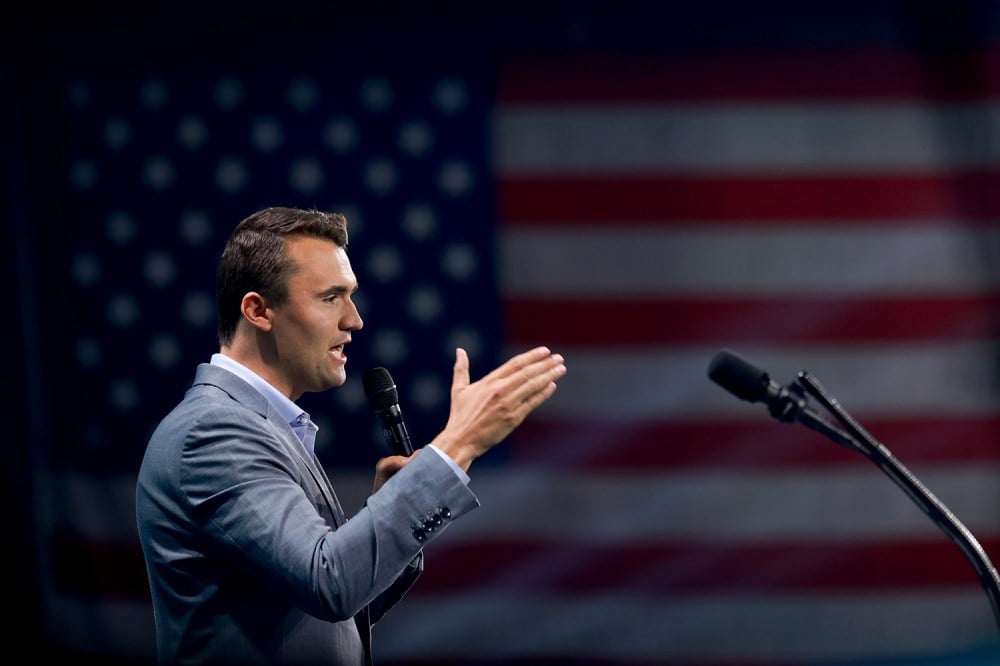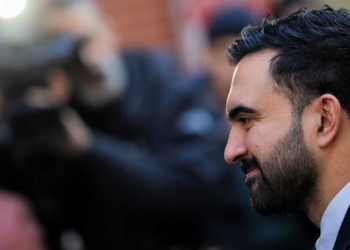Just days before his death, Charlie Kirk was on a speaking tour in Asia—stopping in South Korea and Japan. At Build Up Korea 2025 in Seoul, under elaborate pyrotechnics, he told a crowd of mostly Christian youth that a conservative wave among young men was rising worldwide. He boasted that he had “brought Trump to victory,” tying U.S. right-wing triumphs to a global phenomenon.
In Tokyo, Kirk appeared at a symposium hosted by Japan’s nationalist Sanseito party, which has gained support with anti-immigration and “Japanese first” messaging. He warned of a “silent invasion,” urged resistance to the “globalist menace,” and praised Japan’s social order. Sanseito’s leader later mourned Kirk as a “comrade committed to building the future with us.”
These visits were not routine speaking gigs. They were symbolic acts of alignment between American and Asian far-right forces. When Kirk was killed soon after returning home, the trip took on a near-mythical significance: proof that the movement he embodied was already globalizing. But it also raised questions about this outreach, including: Why would Kirk’s white grievance politics resonate so strongly with nonwhites abroad—masses of people far removed from the culture wars of the United States?
Kirk’s politics were forged in the United States’ culture wars—Christian grievance, hostility to immigration, opposition to feminism and LGBTQ+ rights, suspicion of secular elites. His innovation was packaging these themes for the digital age. TikTok livestreams and podcasts carried his message far beyond U.S. borders. Algorithms made no distinction between a viewer in Dallas or Nairobi.
What quickly became clear is that his rhetoric of lost greatness and threatened masculinity resonated anywhere majority groups felt culturally insecure. Kirk was not so much exporting as being absorbed: His message fused with preexisting anxieties from Eastern Europe, to Africa, to Asia.
Kirk’s canonization after death revealed the consolidation of a “right-wing international.” The phrase recalls the Comintern of the 20th-century left: a loose global network united less by doctrine than by shared antagonisms.
For decades, conservative churches, Catholic “pro-family” nongovernmental organizations, and Orthodox traditionalists have built transnational ties. Events such as the World Congress of Families linked U.S. evangelicals with Russian, African, and Latin American counterparts. Kirk—young, telegenic, digitally fluent—fit seamlessly into this infrastructure. His Asia tour made it explicit: He was not only a bridge but a beacon.
What unites these actors is less theology than common opposition—to pluralism, to gender equality, to secular cosmopolitanism. Kirk’s death made him into a martyr around whom illiberal forces could rally, regardless of creed or color.
Is this a rebirth of fascism? Political theorist Roger Griffin defined fascism as palingenetic ultranationalism: the myth of national rebirth through struggle. Historian Robert Paxton mapped its stages, from marginal agitation to power seizure and radicalization.
Today’s Christian nationalist and illiberal movements display unmistakable family resemblances. They evoke myths of cultural restoration, cast the “true people” against internal enemies, exalt patriarchal masculinity, cultivate martyr cults, and portray politics as existential war.
Yet they also differ from the 1930s. They contest elections, not coups. They often embrace global capitalism. They lack—for now—the fusion of the totalitarian party and the militia state. They are not Nazism reborn but illiberalism with fascist features, capable of sliding further if a crisis provides the opening.
It turns out that the paradox of Kirk’s globalization—that his explicitly white grievance politics resonate among nonwhite majorities—is not really a paradox at all. Majority anxiety is universal. Ethnic and religious majorities worldwide fear cultural dilution. Kirk’s lament for white Christian America adapts seamlessly to Hindu nationalism in India, Orthodox revivalism in Eastern Europe and Russia, and Buddhist chauvinism in Myanmar.
Patriarchal backlash also travels easily, with misogyny finding audiences wherever feminism and LGBTQ+ rights are perceived as threats to tradition. Online, digital remixing strips away racial context, turning Kirk into a generic defender of tradition.
And martyrdom is universal. A violent death transformed him into a global icon, much like Che Guevara became for the left.
The comparison is telling. Guevara was a Cuban revolutionary who became a universal symbol of resistance to imperialism; his image outlived his doctrine. Kirk has become a mirror image: a portable saint of the right, a martyr for resistance to liberalism.
There is also precedent on the far right itself. In the 1930s, Britain’s Oswald Mosley tried to forge a pan-European fascist network, but his project collapsed during World War II. Kirk’s canonization, by contrast, shows how digital networks can now revive that old illiberal aspiration for cross-border solidarity.
This inversion underscores a broader point: Transnational ideological icons are no longer a monopoly of the left. Kirk’s globalization suggests that the tradition of internationalism—once dominated by communists, liberals, and Islamists—now belongs equally to the far right.
Illiberal movements vary by context but converge on three traits: majoritarianism, hostility to pluralism, and defense of patriarchal order. Within this field, three broad families stand out.
The first is Christian nationalism, from U.S. evangelicals, to Poland’s Law and Justice party, to evangelical-driven campaigns in Africa. Here, Kirk’s image circulates as proof that “Christian truth” is under siege.
The second is civilizational nationalism, as seen with Russian President Vladimir Putin and Hungarian Prime Minister Viktor Orban, who portray themselves as guardians of Orthodox or Eurasian values against Western liberalism. In these narratives, Kirk is hailed as an ally.
The third is non-Christian religious nationalism, from Hindutva in India, to Buddhist chauvinism in Myanmar, to Islamist illiberalism. Doctrinally different, they still resonate with Kirk’s anti-liberal idioms.
Together, these families form a polycentric field of global illiberalism—an illiberal international that uses Kirk as a shared symbolic resource.
To liberal democracies, Kirk’s globalization is a warning. They must respond on multiple levels.
First, they must reframe the contest. Illiberals thrive on grievance narratives of tradition versus elites. If democracies only counter with technocracy and procedure, they will lose. They must craft compelling moral stories—about dignity, pluralism, and freedom—that resonate emotionally and rationally.
Second, they must build transnational counter-networks. Illiberals already meet through NGOs and digital communities; democracies need to foster cross-border solidarities among educators, journalists, faith leaders, and activists. The illiberal international is networked, and so must be its opposition.
Third, policymakers must address root grievances. Economic dislocation, demographic anxiety, and cultural insecurity fuel illiberalism. Inclusive growth, civic education, and family support policies must engage these concerns without capitulating to patriarchal backlash.
Finally, they must defend the digital sphere. Kirk’s canonization was turbocharged by algorithms. Democracies must regulate platforms that reward extremism while investing in alternative ecosystems that elevate pluralism.
As Singaporean Prime Minister Lawrence Wong warned after Kirk’s death, extremism is no longer confined to religion: Today’s radicalization is a “toxic mix” that blends neo-Nazi, religious, and incel ideologies. His words capture the urgency by emphasizing that digital grievances can metastasize into violence with frightening speed.
Kirk’s death showed how far the United States’ culture wars now reach—and how quickly martyrdom can transform a domestic agitator into a global icon. The danger is not that fascism has returned wholesale but that its spirit animates a sprawling illiberal international.
Liberal democracies must learn to fight on the same terrain—ideas, networks, symbols, narratives. Otherwise, the Kirk phenomenon will be remembered not just as the globalization of one person’s image but as a milestone in the global decline of liberal modernity. The fascism of the 20th century may not return in identical form. But its embers are burning again in spirit—and the world is ignoring their glow at its own peril.
The post Why Charlie Kirk’s White Nationalism Resonated With Some Nonwhites Abroad appeared first on Foreign Policy.




